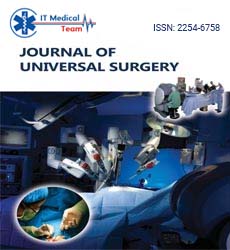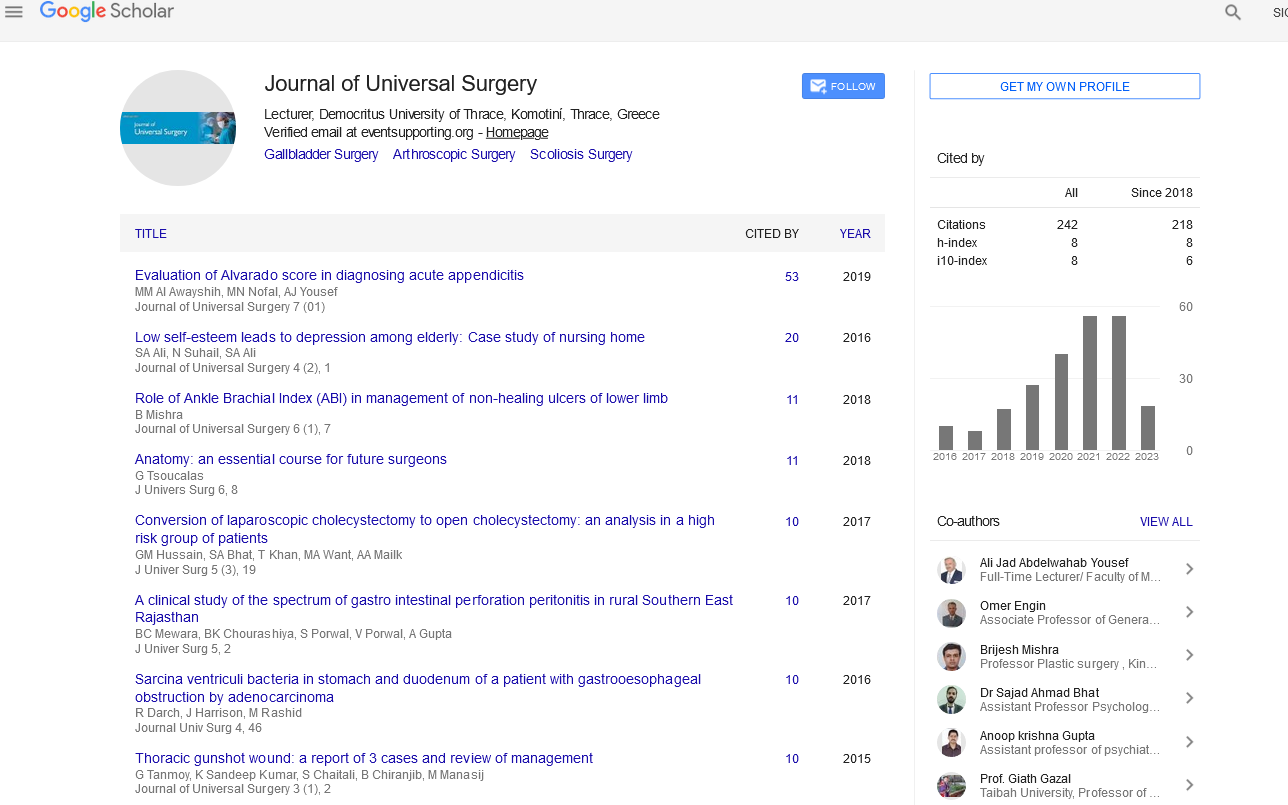Tsoucalas Gregory*
History of Medicine Department, Medical School, University of Athens, Kononos 62-64, Pagrati, Athens, Greece
Corresponding Author:
Tsoucalas Gregory
History of Medicine Department, Medical School
University of Athens, Kononos 62-64
Pagrati, Athens, Greece
Tel: 00306945298205
E-mail: gregorytsoucalas@yahoo.gr
Received Date: September 27, 2016; Accepted Date: September 28, 2016; Published Date: September 30, 2016
Citation: Gregory T. Anticancer Surgical Intervention in Patients with Dementia, to Operate or Not to Operate? A Huge Ethical Dilemma. J Univer Surg. 2016, 4:3. doi:10.21767/2254-6758.100061
A diagnosis of dementia could be frightening for those affected by the syndrome, their family members and caregivers. Dementia is the loss of cognitive functioning, which means the loss of the ability to think, remember, or reason, as well as behavioural abilities, to such an extent that it interferes with a person’s daily life and activities. In fact, this is not a disease but a group of related syndromes. Dementia presents a neurodegenerative, progressively evolving, irreversible brain damage. Its symptomatology alters the patient's life in such a way that at the end he would be "another human being" with a blurred mind, doomed to die most probably by cachexia, lost in his new world. By 2050, one new case of dementias is expected to develop every 33 seconds, resulting in nearly 1 million new cases per year. Yet, other evil ailments could simultaneously appear to compose a more stressful condition. Unfortunately, the prevalence of cancer does not differ in the dementia population, and many face the agony of being treated surgically, non-invasively (chemotherapy, immunotherapy, radiation) or conservative (hormones, palliative medicine). It is to be expected that medicine should treat a person without dementia in just the same way it should treat a person with dementia. In reality, the actual situation of the affected (ability to sustain anaesthesia, live prognosis, quality of live, overall burden) should be strongly considered, alongside with the caregivers (how to cope, economics, psychology) [1-4].
In the case of mild to moderate dementia, things are easier. The patient presents a significant degree of cooperation, while somehow express his opinion on the treatment and the caregivers carry a lighter load to cope. Meanwhile, life expectancy and quality of life are adequate for an interdisciplinary team (neurologist, psychiatrist, oncologist, surgeon, welfare worker, etc.) to suggest some kind of surgery. But in the case of moderate to severe dementia, especially in older individuals, a huge ethical dilemma rises among specialists and the family. To operate, or not to operate? Nevertheless, patients with mild to moderate dementia syndromes could experience postoperative cognitive decline with structural postoperative atrophy of the cortex and hippocampus, found in MRIs, mostly reversed after a time period, able though to stigmatize behavioural and cognitive qualities. Studies worldwide demonstrated that patients suffering from cancer with dementia are less likely to receive aggressive treatment (surgery, radiation) in their end of life than those who were not diagnosed with dementia. In some cases, chemotherapy combined with hormones treatment was suggested. This discrepancy raises important ethical questions for both the clinicians and the healthcare policy-makers. For example, is cancer screening necessary for patients with severe dementia syndromes? Should immunotherapy, adjuvant chemotherapy, or chemotherapy at all be administered? Should extensive surgical procedures and general anaesthesia be carried out? Do our interventions benefit or harm the general status of the patients (homeostasis, cognitive level, clinical being)? [2].
Terminal illness situation poses a tremendous challenge. It has been shown that dementia patients that undergo a surgical operation could be disorganized; present a dramatic sometimes fall of conscience and cognitive level and activation of depression and anxiety syndromes, with loss of their quality of life (MMSE, GCT questionnaire, McGILL Quality of Life Questionnaire). These results are even worse when the patients are in the status of the end-stage dementia, where the "cognitive reserve" is further impaired (MMSE <9, GCT score <18.5). In our opinion, the vast change of the cognitive trajectory on those patients, should lead to the decision for a minimal confrontation, always depending on the patients’ status individually. Normally a hormones-palliation treatment is recommended, or in some cases lumpectomy (when it comes to breast cancer), a partial-superficial breast-conserving surgery or wide local excision, or in other cancer cases minimal surgical operations (stents, tracheotomy) should be performed to alleviate symptoms or reduce the tumour burden. Those interventions in general should depict our maximum efforts to treat cancer patients with severe dementia [3-7].
The complexity of delivering care to end stage dementia patients affected by life-threatening illnesses as cancer, could sometimes lead to a dead end. Some families (<10%) opt for conserving surgery followed by palliative care. In most cases of severe dementia patients, after a careful neurology, oncology and geriatric evaluation, combined with the agreement of the caregivers, the majority should be considered to enrol to a specialized hospice organization, or dementia treatment centre [8]. In modern medicine, patient maters because he is our patient. He matters until the last moment of his life and all physicians should do anything to ensure that he dies peacefully, to live until he dies (Dr. Cicely Mary Saunders, founder of the Modern Hospice Movement) [9]. Furthermore, the hippocratic dogma "do not harm", is still in valid, introducing a quandary for the result of an aggressive procedure, in our subject a surgical one [10]. Thus, in severe dementia, when multiple, complicated, co-morbid states affect care, when it is difficult to ensure proper comfort and quality of life in a fine balance between prolonging survival and supporting a dignified death, when ethics could not lead our way, then the onus is upon as all to show that we have suffered a loss, wondering still to operate or not to operate?
17142
References
- Alzheimer's Association (2016) Alzheimer's disease facts and figures. Alzheimers Dement 12: 459-509.
- Morin L, Beaussant Y, Aubry R, Fastbom J, Johnell K (2016) Aggressiveness of End-of-Life Care for Hospitalized Individuals with Cancer with and without Dementia: A Nationwide Matched-Cohort Study in France. J Am GeriatrSoc 64:1851-1857.
- Mashour G, Avidan M (2013) Neurologic Outcomes of Surgery and Anesthesia. Oxford University Press, Oxford, USA. p. 24.
- Parker MW, Lah JL, Levey AI (2013) Medical Management of the Surgical Patient: A Textbook of Perioperative Medicine, Management of the surgical patient with dementia. Cambridge University Press, Cambridge, UK. p. 396.
- Folstein MF, Folstein SE, McHugh PR (1975) Mini-mental state: A practical method for grading the cognitive state of patients for the clinician. J Psychiatr Res 12: 189-198.
- Tsoucalas G, Bourelia S, Kalogirou V, Giatsiou S, Mavrogiannaki, et al. (2015) End-stage dementia spark of life: reliability and validity of the "GATOS" questionnaire. Curr Alzheimer Res 12: 179-188.
- Cohen SR, Mount BM, Tomas JJ, Mount LF (1996) Existential well-being is an important determinant of quality of life. Evidence from the McGill Quality of Life Questionnaire. Cancer 77: 576-586.
- Archives of Hellenic Reference Centre for Dementia Disease and Related Syndromes, Agios Georgios, Greece.
- Gonzalez MR, Marcelo CD, Stringer MM (2009) Hospice care for 86 year old male with recurrent breast cancer: a case report. Cases J 2: 8357.
- Hippocrates (1849) Morbis de popularibus Complete Works of Hippocrates, 6th edn. Paris, France.





